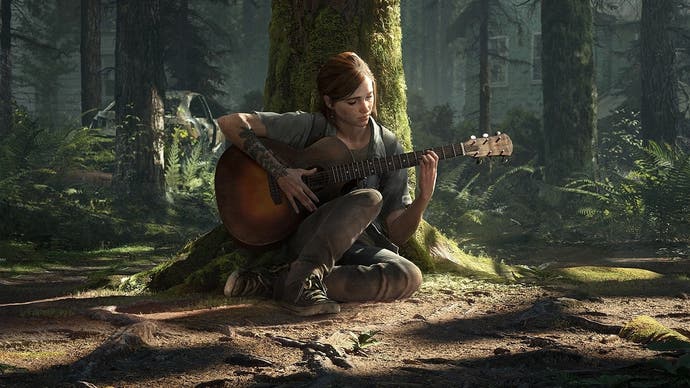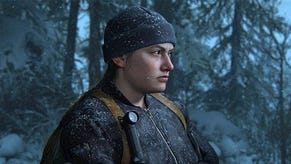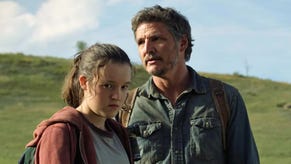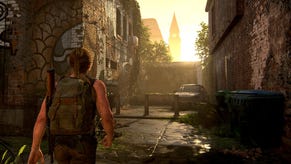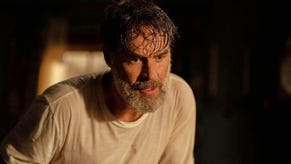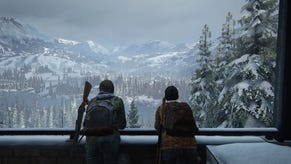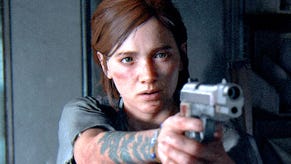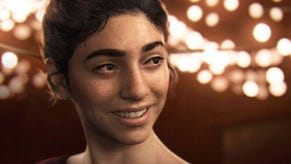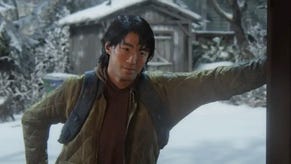The Last of Us Part 2 review - a gut-wrenching sequel
Emerald city blues.
The most common joke about the difficulty video games have reconciling their storytelling impulses with the violent action so many of them depend on revolves around the character Nathan Drake. Star of the Uncharted series, Drake is famed for his easygoing, flippant charm - yet over the course of a single game he will typically kill hundreds of people. They call him the smiling psychopath.
The joke must have stung the Californian Sony studio Naughty Dog, Uncharted's maker. In 2013 they started to grapple with its implications in The Last of Us, a moody post-apocalyptic thriller that upped the graphic brutality while seeking to frame it in the context of a desperate, cruel world, and also contrast it with the delicate bond developing between the protagonist, gruff smuggler Joel, and his cargo, a teen called Ellie.
Now The Last of Us has a sequel, and in that sequel the wrestling match between the game's violent action and its thematic intentions has developed into a full-on, bareknuckle brawl. It is, perhaps for the first time in the history of big-budget action games, a fair match. It gets messy and problematic, and neither side comes out unscathed. But, by taking some big gambles, the developers land decisive blows that will send you reeling.
This isn't even all that The Last of Us Part 2 is attempting. This is a game about women - not about the female experience per se, but a game in which almost all the notable characters are women and in which they are not only shown exhibiting great capability and physical prowess, but also contending with dark impulses typically ascribed to men: trauma, obsession, rage and revenge. It is also a game featuring LGBTQ+ relationships and characters in a prominent but matter-of-fact way - it's not a big deal, they are just there.
And it is doing all this, remember, while remaining very much a crowd-pleasing action spectacular in the Naughty Dog mould, with thrills and spills and scares, beauty and ruin and high adventure. It is a lot. Too much, really, and it is no surprise that this game gets away from its creators at times. (Yes, even the famously controlling Naughty Dog.) Not all of it works. Sometimes the tone veers into a depressing, distasteful nihilism. The characters' motivations don't always stack up. The cast is overstuffed and the subplots are often over- or undercooked. Some of its points are made with an almost laughable bluntness as it hurries on to its next big idea. At other times, it operates with rare subtlety and understatement. You will be halfway through the game before you understand what it's actually doing and more than that before you really begin to feel its dread pull. Towards the very end, it is devastating.
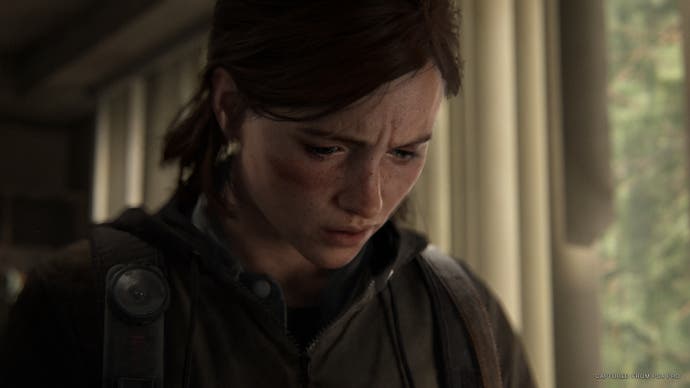
It's a very hard game to discuss without spoilers. I won't share any specifics, but if you want to go in completely cold, it might be wise to stop reading.
The action is set four years after the events of The Last of Us, with intermittent flashbacks that fill us in on how the characters got from there to here. Joel and Ellie have settled in the self-sufficient community of Jackson, Wyoming. The awkwardness between them after Joel's fateful actions at the end of the previous game seems to have widened into a rift. Ellie, less precocious and more defensive and spiky as a young adult, is on the verge of a relationship with a woman called Dina. In the aftermath of a snowstorm, something happens that sees Ellie and Dina set off for Seattle with revenge on their minds.
Seattle, where we spend the majority of the game's runtime, is in bad shape. It's in total ruins, partly flooded, and initially seems deserted but for pockets of infected, the grotesque fungal zombies that have brought society down. In fact, there's a turf war raging here between two factions of survivors. The Washington Liberation Front, or Wolves, are a paramilitary organisation - a more warlike version of the first game's Fireflies - that assumed control of the city from the government after a brutal uprising. They have a darkly charismatic leader called Isaac (a cameo by the magnetic actor Jeffrey Wright), and once we learn more about them, they paint a strikingly different picture of post-outbreak survivalism than the frontiersman stylings of the Jacksonites. The Seraphites, or Scars, are less well drawn, a cut-and-paste post-apocalytpic spooky cult that is never given a plausible reason for existing.

On the warpath, Ellie inserts herself into this struggle and starts causing all sorts of havoc - but only after a lovely lull. When she and Dina first arrive in Seattle, the game's remorseless linear momentum is briefly broken for a pocket of open-world exploration of the ruined downtown district (an evolution of a similar episode in Uncharted: The Lost Legacy). It's a wonderfully atmospheric scene-setter. After this, we're back on Naughty Dog's beaten path for the rest of the game, although the environments are roomy and complex enough to allow for satisfying close exploration as you scavenge for supplies, as well as affording a great deal of flexibility when it comes to combat encounters.
It's during combat that you're most aware that you're playing a sequel from one of the world's most fastidious developers (albeit one that has seldom been known for the refinement of its gameplay mechanics). The careful iteration and professionalism of the design team are very evident. It retains The Last of Us' lean, muscular set-up, in which scarcity of ammo and supplies constantly forces you to experiment. Some of the rougher edges have been knocked off, but not so many as to eradicate its essentially scrappy nature - panicky, desperate scrapes and unintended messy bloodbaths are very much part of the vibe.
So is stealth, which thanks to some mechanical lifts from Uncharted 4 and the addition of a prone stance is much more viable and satisfying to play; this is now a pretty well-sorted stealth game in its own right. Like any game in which death comes quickly, it can still frustrate, but a very clever smart autosave system keeps good pace with your progress and means you'll seldom need to restart a whole encounter. (The whole game experience is unbelievably slick and seamless, even by Naughty Dog's standards.) My chief complaint is that you spend more time battling humans than infected, and they're actually the less interesting - as well as less scary - combatants to face.
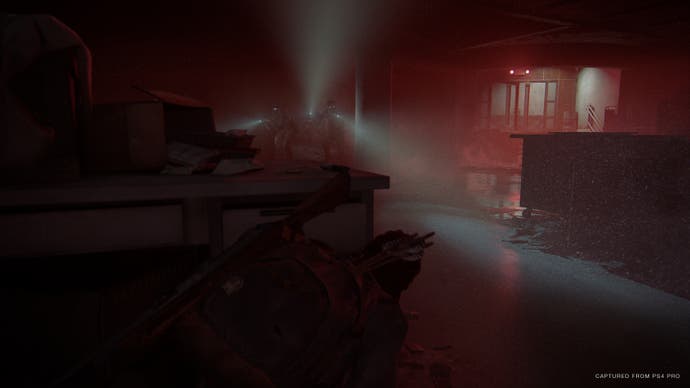
The violence is extremely graphic, uncomfortably so. It's full of ugly flourishes, like the splattering sound of shotgun pellets ripping apart flesh, or the vicious flick that Ellie uses to slice open a neck as she performs a stealth kill. It can be sickening. Intentionally so? Surely. But I still can't help but detect a sour, grubby note of gratification to it, particularly in the repetitive context of the combat. Sometimes it breaks your connection to Ellie in a way that doesn't serve the game. Sometimes, in cutscenes, it's just taken too far, more than is needed to leave an impact or make a point.
This is one reason why I initially suspected The Last of Us Part 2 of being too caught up in its own grim attitude, of just being highly polished misery porn. Another is that, with its attention divided between so many ambitious gambits, with an expanding cast of characters and with most of the action taking place over a matter of days, it doesn't have the first game's gentle but constant emotional core - that delicious slow thawing between Ellie and Joel, melting into love as you journey with them over the course of a year. (Ellie and Dina's romance might have been that, but it doesn't get the necessary screen time - admittedly for good reasons.) Without that warmth, that heart, it seems a bitter world to spend time in.
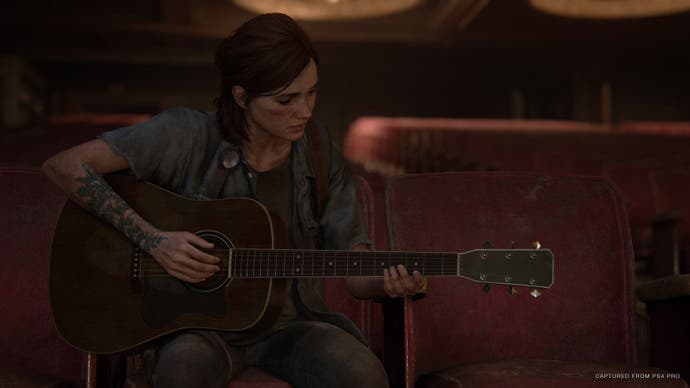
I'm happy to report that my first impressions were wrong. Unfortunately, I can't and shouldn't fully explain why. I'll limit myself to this: Druckmann and his team have a grand plan that rests on a radical structure for the game which isn't initially apparent. Once you finally understand it, it's still a slow burn, as the writers' delicate character-building - the dialogue is wonderfully understated and naturalistic - needs time to do its work. So it isn't until the game's final stretches that it gathers its true power, as you approach a point that is all the more horrifying for its total inevitability.
It's a huge roll of the dice from the developers, but it works, and the pay-off is almost indescribable. It would be too much to claim that you will never feel the same about video game violence again, but the shock is profound and discomfiting. It's gut-wrenching stuff. There's more to come as the game approaches an ending that is just as affecting and emotionally complex as its predecessor's, if not, perhaps, as ambiguous.
The thing that really struck me - and pleasantly surprised me, coming as it does from a developer so transparently in love with the language of cinema - is that The Last of Us Part 2's power is wholly unique to it being a video game. There is a special kind of empathy that develops between a player and a game protagonist that no other medium can reproduce. It's this bond that Druckmann and his team have exploited to such devastating effect. It is a sad and timely reminder of the simultaneous importance and impossibility of living someone else's experience. Play it, and listen.
